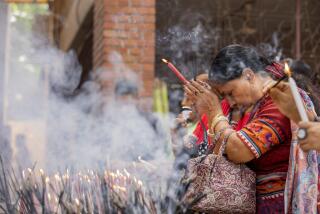India Court Bars Prayer Vigil
- Share via
NEW DELHI — India’s Supreme Court today ruled against Hindu nationalist demands to hold a symbolic prayer ceremony near the site of a razed 16th century mosque.
Standing by the court’s 1994 decision, a three-judge panel ruled that no religious ceremonies would be allowed near the disputed site until several legal cases were settled.
The panel asked the government to detail efforts to ensure that religious riots would not break out if the ceremony were to go ahead.
The mosque site was a partial cause of the religious violence that has engulfed the western state of Gujarat in recent weeks. More than 600 people have been killed in religious violence that erupted Feb. 27 when Muslims set fire to a train carrying Hindus returning from a pilgrimage to the holy site in the northern city of Ayodhya. Hindus went on a revengeful rampage, destroying Muslim businesses and burning Muslims alive.
Hindu priests and fundamentalists have insisted that no matter what the court ruled, they intend to pray near the ruins of the Babri mosque Friday.
The Hindus said they would dedicate stones or pillars that will be used in a temple they hope to build where the mosque once stood in Ayodhya.
On Tuesday, thousands of Hindus were trying to head toward Ayodhya. Hard-line Hindus--from the same ideological family as the ruling Bharatiya Janata Party--have vowed to take part in the prayer ceremony, or puja, and show their support for the temple plans.
“No court can stop us performing the puja. If it does, it will be injustice against the Hindus,” said Haresh Bhatt, from the hard-line Vishwa Hindu Parishad in Gujarat.
He said 1,000 people were leaving by train for Ayodhya on Tuesday and dismissed police warnings that they would be arrested. “If we can’t catch the train tonight, there are other ways to go. But we will be in Ayodhya by March 15,” he said.
The Muslims see a prayer session as a prelude to the building of the temple on the site of the mosque, which was razed by Hindu extremists in 1992, triggering nationwide riots in which at least 2,000 people were killed. The Hindu hard-liners say the structure was built by Muslim invaders on the birthplace of the Hindu god-king Ram.
The dispute is at the root of India’s worst communal violence in a decade, which began late last month when a Muslim mob attacked a train carrying Hindu activists from Ayodhya, killing 58.
That sparked reprisals in which the more than 600 people, mostly Muslims, were killed in Gujarat. Thousands of Muslims are still staying in relief camps, too frightened to go home.
In Gujarat’s commercial capital, Ahmadabad, about 500 armed police and paramilitary soldiers guarded the railway station where Hindu devotees have threatened to catch the Sabarmati Express--the same train torched in February.
One hard-liner said even if police arrested identifiable activists, about 500 would go anyway as regular passengers.
The train goes as far as Ayodhya, although authorities are now diverting railway traffic to prevent passengers from getting off there or in the neighboring town of Faizabad.
In Calcutta, in eastern India, senior police official N.C. Ghosh said police were checking trains, buses and railway stations to stop activists, but he said it would be impossible to stop each and every individual from getting through.
Ajay Nandi of Vishwa Hindu Parishad told reporters in Calcutta that he expected about 8,000 activists to go to Ayodhya from the region.
In Bombay, Vishwa Hindu Parishad said it would hold its own prayer ceremony Friday even if the Supreme Court ruled against it.
Vyankatesh Abdev, Vishwa Hindu Parishad leader in the western state of Maharashtra, said Muslims need not fear the worst since the Vishwa Hindu Parishad also wanted peace. But he warned Muslims of retaliation if they tried to provoke Hindu volunteers heading for Ayodhya.
More to Read
Sign up for Essential California
The most important California stories and recommendations in your inbox every morning.
You may occasionally receive promotional content from the Los Angeles Times.










